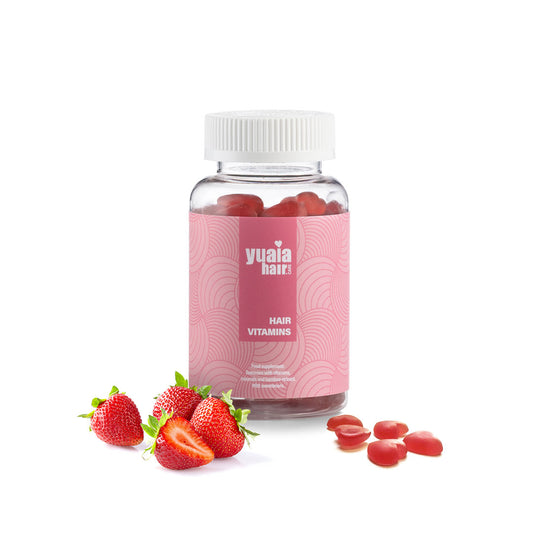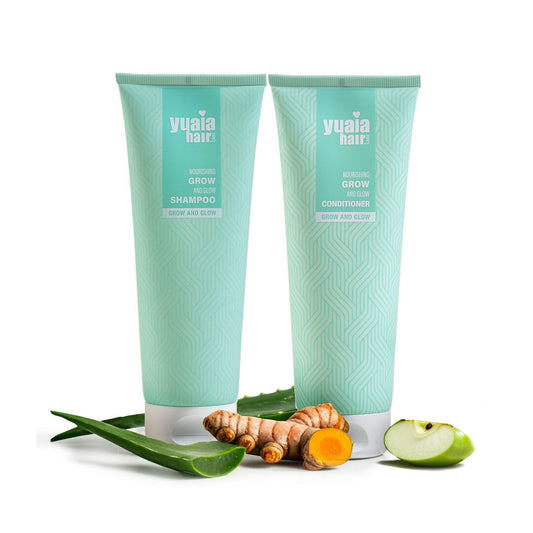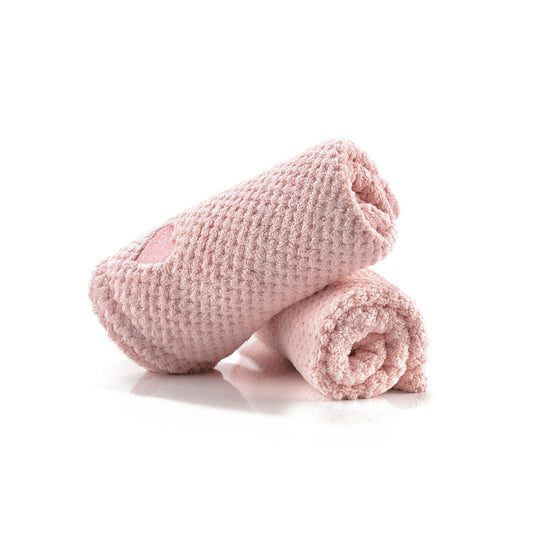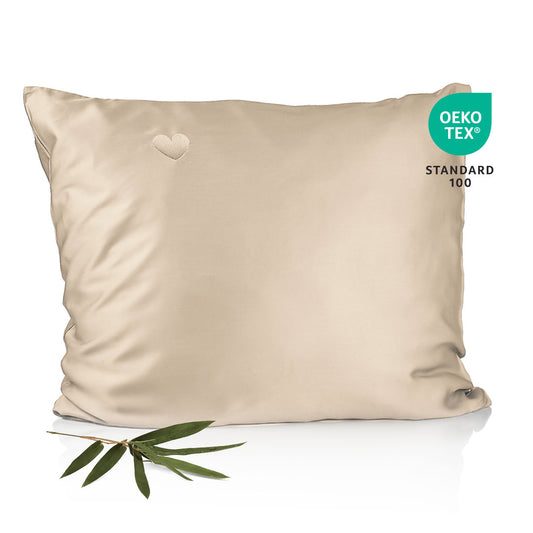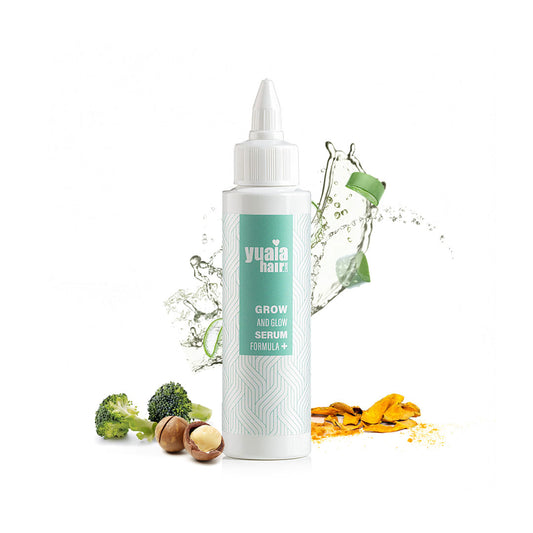Good products for dry scalp
Caring for a dry scalp requires careful attention and the right tools. Two products that can make a significant difference are a microfibre hair towel and a bamboo pillowcase. These products work together to maintain a healthy scalp.
The microfibre hair towel is extra gentle on your hair and scalp as it reduces friction and dries hair quickly without causing irritation. This is important as wet hair is more vulnerable.
The bamboo pillowcase protects your hair and skin at night by preventing sleep wrinkles and avoiding tangled hair. The soft surface of bamboo is gentle on your hair and helps maintain its health.
Together, these products form an effective toolkit to prevent and treat dry scalp while ensuring your hair stays healthy and well cared for.
Is there a connection between dry scalp and hair loss?
Since your hair grows out of your scalp, there can often be a link between an itchy, dry scalp and hair loss. If your scalp is irritated or out of balance, it can result in hair loss in the worst case scenario. As well as it can aggravate existing hair loss problems.
Would you like to prevent or reduce hair loss? Then you should look at both your hair and the health of your scalp - you can read all about this in this guide . Both parts are essential if you want to have normal hair beauty.
We hope that you have received answers to your questions. At least now you know more about dry scalp, its causes and treatment options. And then you are already well on your way to a prettier and healthier hairstyle.
Scalp health and hair growth
Scalp health plays an important role in the overall condition and growth of hair. When it comes to dry scalp, there is a close correlation between scalp condition and hair health.
Dry scalp can have significant consequences for hair. Firstly, it can lead to increased hair loss. The dry conditions make hair more fragile, resulting in breakage and loss of hair strands. This can cause hair to look thinner and lose its strength over time.
In addition, dry scalp can also affect hair growth itself. A healthy scalp is essential for optimal hair growth. Dry scalp can lead to clogged hair follicles, which inhibits the hair's ability to grow healthy and strong. This can lead to slower hair growth and even result in new hair not growing evenly or in sufficient quantity.
To maintain healthy hair, it's therefore important to care for and moisturise your scalp regularly, especially if you suffer from dry scalp. Using moisturising shampoos and conditioners specifically designed for dry scalp can help restore the scalp's moisture balance and reduce the risk of hair loss and poor hair growth.

Does my hair type affect dry scalp?
One important factor that plays a role in the development of dry scalp is your hair type. Hair comes in different textures, from curly to straight and everything in between, and it can have a significant impact on the health of your scalp.
Curly hair
People with curly hair often tend to have a more parched scalp compared to other hair types. This is because the natural oils produced on the scalp have a harder time reaching the ends of curly hair due to its wavy texture. As a result, curly hair can have an increased risk of dryness and itchiness on the scalp.
Straight hair
People with straight hair usually have a more even distribution of the natural oils from the scalp to the ends of the hair. This can help maintain a healthier scalp, but it doesn't necessarily mean that straight hair is immune to dryness. Factors such as frequent hair washing or using drying hair products can still lead to a dry scalp.
Wavy hair
Wavy hair is between curly and straight hair in texture. It can tend to absorb natural oils from the scalp, which can help keep the scalp well-hydrated. However, just like with other hair types, wavy hair can also experience dryness, especially if adequate care is not taken.
It's important to understand your own hair type and its unique needs to prevent and treat dry scalp. Hair care product choices and routines should take your hair type into account to maintain a healthy and moisturised scalp.
Is dry scalp common in children?
Yes, dry scalp is common in children. Children can experience dry scalp for various reasons and it can be a temporary condition or a chronic condition.
Dry scalp in children can be caused by several factors, including weather conditions, hormonal changes, skin conditions or allergic reactions. In most cases, however, it is temporary and can be easily treated.
To treat dry scalp in children, it is recommended to use mild and gentle shampoos and conditioners. It is also important to avoid excessive use of hair dryers or hot styling tools as these can worsen dryness.
If the dryness persists or becomes more severe, it may be a good idea to consult a doctor or a skin specialist. They can carry out an examination of the child's scalp and give the right treatment or recommendations.
Is it necessary to seek medical attention for dry scalp?
Yes, it may be necessary to seek medical attention for dry scalp, especially if the symptoms are severe or persistent.
Dry scalp can be caused by several factors, including dry air, cold, excessive hair washing, use of harsh hair products, or certain medical conditions such as eczema or psoriasis. It can result in itching, scaly skin, redness and discomfort.
If you experience severe itching, inflammation or sores on your scalp, you should consult a doctor. These symptoms may indicate a more serious condition that requires medical treatment.
hairbrush
Is dry scalp common in children?
Yes, dry scalp is common in children. Children can experience dry scalp for various reasons and it can be a temporary condition or a chronic condition.
Dry scalp in children can be caused by several factors, including weather conditions, hormonal changes, skin conditions or allergic reactions. In most cases, however, it is temporary and can be easily treated.
To treat dry scalp in children, it is recommended to use mild and gentle shampoos and conditioners. It is also important to avoid excessive use of hair dryers or hot styling tools as these can worsen dryness.
If the dryness persists or becomes more severe, it may be a good idea to consult a doctor or a skin specialist. They can carry out an examination of the child's scalp and give the right treatment or recommendations.
Is it necessary to seek medical attention for dry scalp?
Yes, it may be necessary to seek medical attention for dry scalp, especially if the symptoms are severe or persistent.
Dry scalp can be caused by several factors, including dry air, cold, excessive hair washing, use of harsh hair products, or certain medical conditions such as eczema or psoriasis. It can result in itching, scaly skin, redness and discomfort.
If you experience severe itching, inflammation or sores on your scalp, you should consult a doctor. These symptoms may indicate a more serious condition that requires medical treatment.
hair care
 2-5 day delivery
2-5 day delivery
 25.000+ satisfied customers
25.000+ satisfied customers
 Satisfaction Guarantee
Satisfaction Guarantee




















